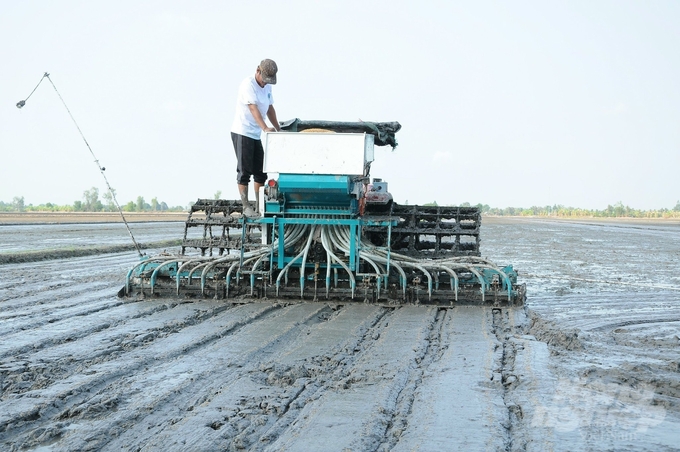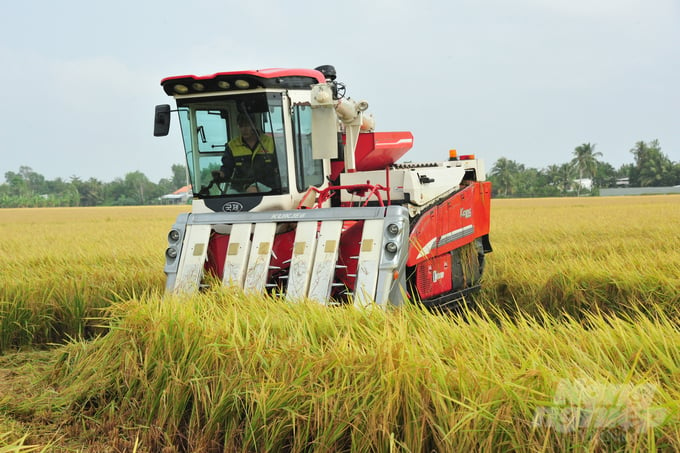June 17, 2025 | 07:26 GMT +7
June 17, 2025 | 07:26 GMT +7
Hotline: 0913.378.918
June 17, 2025 | 07:26 GMT +7
Hotline: 0913.378.918

Can Tho city is launching a pilot model for the 1 million ha of high-quality rice project, with an area of 50ha at the Tien Thuan Cooperative in Vinh Thanh District, starting from the 2024 summer-autumn season. Photo: Le Hoang Vu.
On November 13, the Can Tho Department of Agriculture and Rural Development in collaboration with Co Do district organized a conference to introduce and discuss the implementation of the project titled "Sustainable development of 1 million hectares of high-quality, low-emission rice cultivation linked to green growth in the Mekong Delta region by 2030". The aim of the conference was to evaluate the progress made in the project so far, as well as to plan and define the upcoming tasks and directions for the future.
During the conference, Mr. Tran Thai Nghiem, Deputy Director of the Can Tho Department of Agriculture and Rural Development, shared that Can Tho is the first city in the Mekong Delta region to cooperate with the Ministry of Agriculture and Rural Development in launching the pilot model of the 1 Million hectares of high-quality rice initiative. This model will initially cover 50ha at theTien Thuan Cooperative in Vinh Thanh District, with implementation set to begin in the 2024 summer-autumn crop season.
Furthermore, the Can Tho agricultural sector is also collaborating with other relevant agencies and organizations to roll out an additional model for high-quality, low-emission rice cultivation. This second model will span 1.2 ha and will be implemented at the New Green Farm Cooperative in Thot Not district.
These models have demonstrated their effectiveness, significantly improving production efficiency and increasing profits for farmers compared to traditional farming methods. At the same time, they have made a notable contribution to reducing greenhouse gas emissions. This has been achieved through practices such as minimizing the use of seeds, fertilizers, and pesticides, adopting intermittent flooding and drying irrigation techniques, and removing rice straw from the fields after harvest.
For the upcoming 2024-2025 winter-spring season, Can Tho plans to expand the area under this high-quality, low-emission rice farming model to a total of 200ha.
The agricultural sector in Can Tho is working towards the goal of establishing a large-scale area dedicated to high-quality, low-emission rice production, with the aim of reaching approximately 38.000ha by the end of 2025. By 2030, this area is expected to grow to 48.000ha. Can Tho has identified three key rice-growing district, including Vinh Thanh, Co Do and Thoi Lai, as the primary regions for implementing the 1 Million hectares of high-quality rice project.
During the conference, Mr. Nguyen Ngoc He, the Vice Chairman of the Can Tho People's Committee, expressed appreciation for the insightful and practical suggestions provided by the participants. He particularly highlighted the strong support and consensus from businesses, cooperatives, and farmers, who have shown a high level of agreement with the vision of collaborating to successfully implement the project. The enthusiasm and commitment shared by all stakeholders reflect a collective determination to work together to ensure the success of the 1 Million hectares of high-quality rice initiative in Can Tho.

The agricultural sector of Can Tho City aims to establish a dedicated area for high-quality, low-emission rice cultivation, covering 38.000ha by the end of 2025. Photo: Le Hoang Vu.
Mr. Nguyen Ngoc He, Vice Chairman of the Can Tho People's Committee, requested that the Can Tho Department of Agriculture and Rural Development carefully gather and compile the feedback provided during the conference in order to offer timely recommendations and proposals to the Can Tho People's Committee as the project moves forward. It is crucial for the Department, in collaboration with other city departments, local authorities, and relevant agencies, to continue enhancing training programs for officials, cooperatives, and farmers in the areas where the project is being implemented. These training sessions should cover a wide range of topics, including the overall objectives, significance, and importance of the project, as well as detailed guidance on the methodologies, processes, and specific criteria that need to be followed in order to successfully carry out the project.
In parallel with this, efforts should continue to build and scale up the different models outlined in the project. These models include those focused on production that adheres to the standards and technical procedures established by the project, as well as models for the effective management of rice straw, the application of mechanization and advanced technologies, and the promotion of digital transformation in agricultural practices. Investing in key agricultural and rural infrastructure, particularly in areas such as transportation, irrigation, and electricity supply.
Additionally, Can Tho Department of Agriculture and Rural Development have to provide advice and policy recommendations to the relevant authorities at the city level regarding strategies to increase the investment funds available for agriculture and rural development. The Department should also focus on mobilizing resources from different sectors to ensure the successful implementation and continued progress of the project.
Translated by Phuong Linh
![Turning wind and rain into action: [4] Bringing climate bulletins to remote and isolated areas](https://t.ex-cdn.com/nongnghiepmoitruong.vn/608w/files/linhnhp/2025/06/14/1152-z6704423696987_15fd32ffc26d590d204d520c9dac6786-nongnghiep-151141.jpg)
(VAN) The Vietnam Agriculture and Nature Newspaper interviewed Mr. Vu Thai Truong, Acting Head of Climate Change and Environment at UNDP Vietnam, to gain deeper insight into how climate bulletins are delivered to farmers.

(VAN) In Tien Giang, a high-tech shrimp farm has developed a distinctive energy-saving farming model that has yielded promising results.
![Turning wind and rain into action: [3] 300.000 farmers benefit from agro-climatic bulletins](https://t.ex-cdn.com/nongnghiepmoitruong.vn/608w/files/news/2025/06/12/e5a48259d6a262fc3bb3-nongnghiep-125122.jpg)
(VAN) The agro-climatic bulletin has become a valuable tool for farmers in the Mekong Delta. After more than five years of implementation, the initiative is gradually being expanded nationwide.
![Turning wind and rain into action: [2] Providing forecasts to the people](https://t.ex-cdn.com/nongnghiepmoitruong.vn/608w/files/news/2025/06/12/e5a48259d6a262fc3bb3-nongnghiep-103927.jpg)
(VAN) In addition to improving the quality of hydrometeorological forecasts, putting forecast bulletins into practical use is crucial for production and disaster prevention.

(VAN) Blue carbon is receiving attention for its rapid absorption capacity and vast potential. It represents a promising nature-based solution to respond to climate change.
/2025/06/11/3507-1-161904_583.jpg)
(VAN) Seagrass beds and coral reefs serve as 'cradles' that nurture life in the ocean depths, creating rich aquatic resources in Vietnamese waters.
![Turning wind and rain into action: [1] Forecasting for farmers](https://t.ex-cdn.com/nongnghiepmoitruong.vn/608w/files/news/2025/06/11/e5a48259d6a262fc3bb3-nongnghiep-111919.jpg)
(VAN) Weather is no longer just a matter of fate. Forecasts have now become an essential companion for farmers in every crop season.